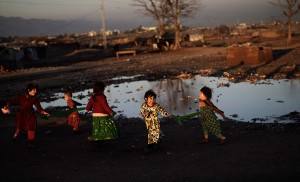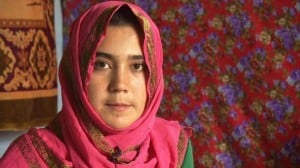A story about a female sniper in Aleppo, Syria speaks to the imagination, but articles about the terror Syrian women have to endure are more common. Inside Syria rape and sexual assault is rampant; an initiative by Columbia University hopes to track rape inside Syria by following social media. Khetam Bneyan has been out of Syrian jail for a month now, but she cannot forget the women and their stories she left behind. Syrian refugees, and in particular women, face difficulties outside Syria too. Domestic violence is rampant among Syrian refugees and for many women and girls (early) marriage or sex work seem to be the only means of survival.
Kashmiri girl band Pragaash calls it quits, after a senior cleric called them “un-Islamic”. Iranian all-girl group Ghazal band is surprised by the fatwa; they have performing Sufi music in Iran for over a year, and have never met any (religious) resistance, they say.
More stories on the persecution of Malian women under the Islamist regime emerge; The Associated Press features a very detailed “forbidden love story” of Salaka Djicke, a story that has been featured in many other articles too.
The vast majority of young Muslims in the Democratic Republic of Congo are rejecting polygyny, which, until quite recently, was a common practice in the Congolese Muslim community.

The Yemeni capital Sana’a held its first fashion show. which featured mainly traditional Yemeni costumes with a modern twist, under tight security.
A young woman in London, Naomi Oni, was attacked at night by a woman wearing the niqab, who threw acid in her face, after which Naomi Oni had to spend a month in a burns unit in a local hospital. The identity of the woman is still unclear, and the police think this was a random act of violence. May Allah bring this woman to justice.
A new draft bill in Turkey on abortion will make legal abortion almost impossible, especially for rural and poor women.
Somalia’s new government has said that it will do more to protect victims of rape. In the mean time, a journalist, who published a rape report, and an alleged rape victim have been sentenced to one year in jail.
A Pakistani man was beaten by his two ex-wives, who are sisters, for allegedly kidnapping and forcing their younger sister to marry him.
Qantara.de features an article on the group The uprising of women in the Arab world.
After being confined in a women’s shelter for over 13 months, Afghan rape victim Gulnaz has last weekend married her attacker.
Nurgul Tohti, a Uyghur mother has been held without trial by the Chinese authorities for 8 months, after she urged them to investigate the abduction of her young son back in 2009. The failure of the Chinese government to further investigate this case is, according to her, an example of ethnic discrimination.
The field of architecture in the Arab Gulf is increasingly dominated by women; in local universities, male architecture students are the minority.
26 percent of the top executives of Turkish largest corporations are female, which is well above the EU average, but the labour participation of Turkish women is still considered to be very low.
The Philippine Daily Inquirer features an article on the role Muslim women play in the peace negotiations on Mindanao, and the neighbouring islands.
According to an Egyptian preacher, the rape of women in Tahrir square is justified. Thursday, thousands of men and women marched against sexual harassment of female protesters.
The death of a five-year-old girl, Lama, allegedly caused by beatings from her father, has sparked an outrage in Saudi Arabia. The father was absolved by a judge and has to pay blood money to her family. the amount of which is half the amount which would have to be paid if Lama was male.
An increasing number of Kenyan men belonging to communities that practice Female Genital Mutilation (FGM) are speaking out against the now illegal practice.
The Toronto Star features an interview with a local (niqabi) woman, Fathima Farook, who successfully sells her produce at a local farmers market. Despite the promise to go “behind the niqab”, in this article the author seems to be of the opinion that the niqab is the most fascinating aspect of this woman.
According to a court decision, Libyan men are now allowed to marry a second wife, without obtaining consent from the first wife, in contrast to the ruling under Ghaddafi’s regime.














